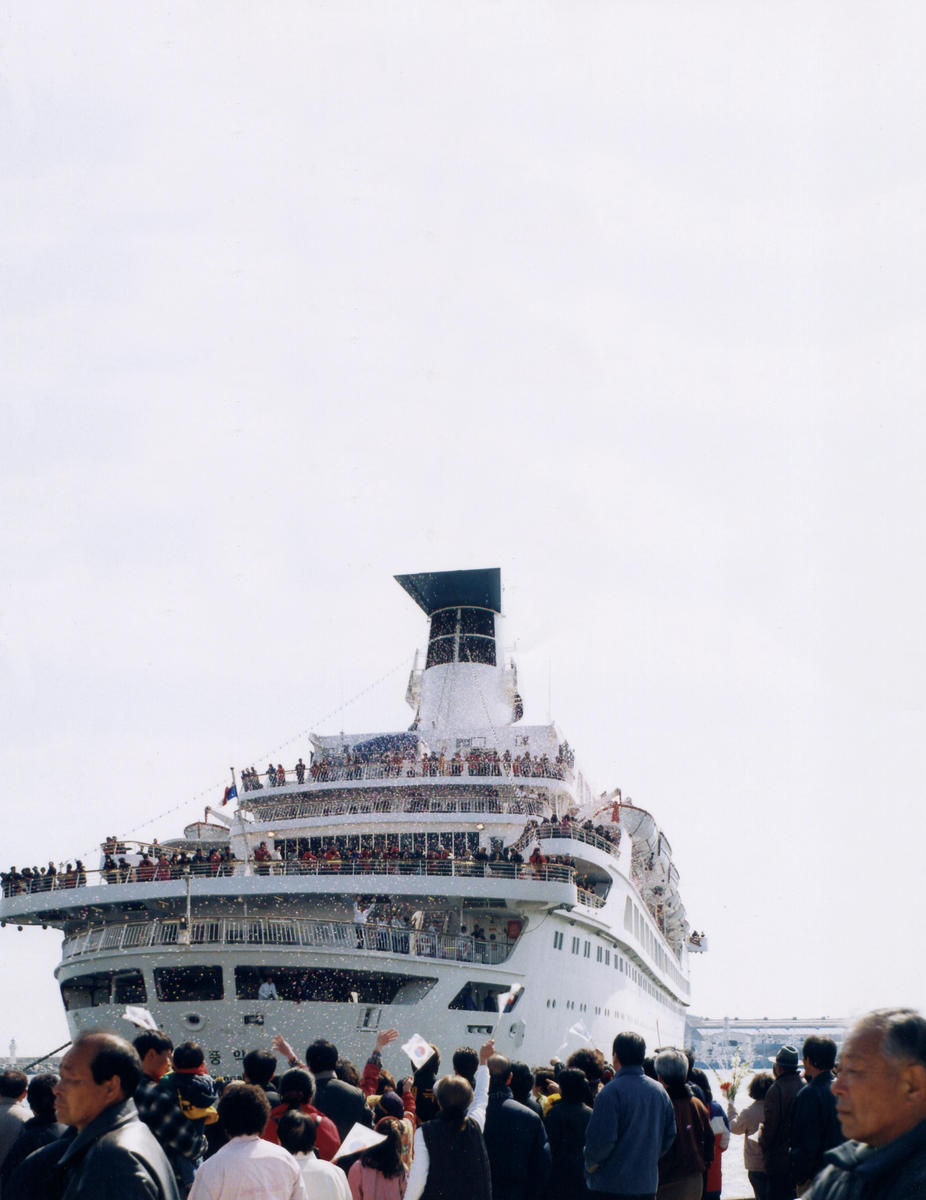
Pirates, statisticians and orgmen, cruise ship directors and offshore gambling operators-these are the protagonists of Keller Easterling’s new book, Enduring Innocence: Global Architecture and its Political Masquerades, a text that examines the relationship between politics and architecture in contemporary culture. Why is it now snowing in Dubai? Why is The Love Boat so popular in North Korea? According to Easterling, an analysis of these phenomena — parsing through tourist itineraries and marketing literature, venture capital portfolios and tourist guidebooks — teaches us something not only about the current state of popular culture, consumption, and trade, but also about the nature and function of architecture in our neoliberal age and the patterns of urban growth that are likely to define the twenty-first century. A critic of both the wide-eyed idealism of the anti-global left and the opportunism of the laissez-faire right, she is especially interested in how the tax attorney’s search for legal loopholes, for instance, or the speculator’s quest for exotic new investment instruments, might also guide the designer, architect or planner in his or her ambition to analyze and design new terrains — ones that could, in some small way, promote positive social and economic outcomes.
Nader Vossoughian: Where does the title of the book, Enduring Innocence, come from?
Keller Easterling: It was a play on both Operation Enduring Freedom, the military campaign in Afghanistan, and “the enduring spirit of freedom,” which is carved into the cornerstone of the World Trade Center. Both the military campaign and the building embodied a righteous entrenchment, competition, or aggression. Declarations of absolute righteousness and innocence commonly accompany violence. A self-reflexive belief in one’s innocence is essential to the chemistry of the just war. Innocence is similar to ignorance in that it must banish contradictory information to remain intact. The title also suggests that innocence, in its very purity, is something to be endured.
After September 11, Bush and bin Laden were the perfect embodiment of this kind of violence. It was symmetrical, competitive, and escalating. The more violent it became, the more each side claimed absolutely snow-white innocence.
NV: It seems that one of the things you’re trying to question in your book is the perception that globalism acts as a unifying force in the world. You seem to be interested in how it actually promotes division, disruption and corruption. Is that an adequate description?
KE: I wanted to talk about not one world, but multiple worlds, multiple currents and multiple seas. I wanted to look at segregated domains of logic and power that have taut boundaries. The fallout between these worlds of logic identifies a site for resistance, a site for contagions that perhaps disrupt what longs to remain intact.
NV: What would be an example of a contagion?
KE: You can see very specific architectural formats, programs, suites of programs, building types, legal envelopes and building technologies acting as contagions. A simple detail for a high-tech greenhouse that starts slowly in the 1970s and spreads in the next one or two decades over two hundred square miles in El Ejido — that’s a contagion. Or a legal envelope like an export processing zone, which someone tried out in Shannon, Ireland in the 1960s, becomes a widespread instrument of global development — that’s also a contagion. The “zone,” whether it is an export processing zone or a free trade zone or a special economic zone, is the aggregate of a new form of the global city. Since they are usually exempt from taxes, labor restrictions and laws concerning materials and environment, these zones are units of aggregation that demonstrate the character of self-reflexive regimes or apolitical lacunae. So the question is: “Might resistance sometimes take the form of a counter-contagion here?”
NV: Do you agree with thinkers like Michael Hardt and Antonio Negri, who say that capitalism, technology and globalism are helping spawn interesting pockets of resistance in contemporary society, that Empire can serve positive as well as negative ends?
KE: Empire, counter-empire — they’re both swimming in the same water, using the same tools, and one needs to use many different kinds of instruments. Many political consequences, even if they are the result of deliberate intentions, are rarely vetted through official political processes. Resistance, too, might operate in these unofficial channels of pirates and other non-state actors.
NV: Could you tell us something about the orgman? Who is he? He seems to play a big role in your book.
KE: Orgman was Harold Rosenberg’s nickname for William Whyte’s “organization man.” Described in his 1956 book The Organization Man, Whyte’s organization man was a technocrat and team-player. Today’s orgmen are not docile Rotarians in the grey flannel suit, but another kind of can-do character who operates in the realm of logistics and organization. The orgman is the guy who went to a school of hotel management and is now planning cruise ship schedules and developing time-shares. Or he is doing high-tech agriculture or handling trans-shipments in a free trade zone.
NV: In your chapter on North Korea, you talk about modern-day communism’s “adventures with capitalism,” that is, how gambling and tourism are making significant inroads in communist-bloc countries. In your analysis of the work of Maharishi Mahesh Yogi, meanwhile, you discuss how marketing and management have blurred the boundaries between worship and profit to unprecedented degrees. Could you perhaps say something more about these developments?

KE: They’re perfectly beautiful, the North Koreans. Like the Maharishi group, they continually refresh their power with new stories and obfuscations. One of the things that I wish had become more central in the book is the notion of stupidity. Stupidity has the ability to act as a narcotic that includes everyone. Stupidity can simultaneously evade any reckoning. Its perfect, and, of course, it’s also innocent and pure.
It seemed that the Maharishi and a lot of other ad campaigns and marketing strategies also have this idea of refreshing a series of lies. Stupidity is a very successful political strategy. North Korea, for instance, adopts laissez-faire capitalist ideas one minute, free-trade Dubai-style urbanism another, and mid-century agro-Soviet ideas the next. It doesn’t matter. Consistency is not the point.
NV: When I think of the orgman, I think of workers following strict rules and protocols. But the notion of stupidity — that to me seems to be at odds with what the orgman represents.
KE: I know what you mean. The thing that surprised me about a lot of these organizational formats — or spatial products — is that there is this kind of undergirding of logic, rules, schedules, stats, logistics — all of that. But those formats are also the vehicle for the most incredible myths and fairytales. Cruise ship tourism is a perfect example. How many people are likely to show up for aerobics on the cruise deck? How many people are likely to have veal parmesan on Italian night? This kind of management is what makes the cruise ship work. But it must also maintain changing sets of fantasies about any number of things like luxury or exotic locations. And the two together — the combination of rules and fantasies — creates the somewhat irrational quotient of value. Here, one wants to reference Pierre Bourdieu’s formulations about symbolic capital, the cultural stories that are crucial to the status of economic exchange. Of course, techniques of marketing allow the value of these seemingly irrational fantasies to be fully tabulated and capitalized. They offer not an ineffable aura but a bottom line.
NV: What is a spatial product, exactly?
KE: I use that term because I once saw, looking at a lot of industry literature, something called a “real estate product.” I kept seeing these formulas for space that developers were able to define and sell even in the absence of a location or a building. There are many such recipes and formulas that naturally index qualities essential to the formula. So a tourist resort is looking for a certain temperature and color of sand. Such conditions mesh with a marketing profile and a number of other parameters to create “the package.”
NV: What was your recent trip to Dubai like?
KE: Dubai is the global city’s global city. It is trying to be in the world before it is in the Gulf. So I think the thing I enjoyed most was traveling between the Emirates. Going between Abu Dhabi or Sharjah, you feel as if you are quickly traveling through the ancient and recent history of the Gulf, traveling through slightly different tinctures of modernism, suddenly jumping up in scale, forward or backward in time.
Similarly, the entire federation acts as a provocation. What looks like an Uber-version of anything else in the world camouflages a very different political structure and chemistry. All of the West’s political theorizing about democracy as an ultimate goal can potentially be seen through a disruptive lens. The underlying governmental structures that regulate labor, trade and investment are sometimes fascinating inversions of our own approaches to the same issues. The regulations may, however, be no less corrupt or abusive.
NV: How would you characterize the state of tourism in the world today? You seem to see it as intimately linked to war and strategies of military defense. Could you say something about that?
KE: Because the question is broad, my thoughts bounce between Dean MacCannell’s discussion of the tourist as the new cultural subject (instead of the worker) and Zygmunt Bauman’s discussion of the tourist and the vagabond (the itinerant laborer refugee) as alter-egos. These seem tantalizing enough to be also insufficient somehow. Certainly, the notion that tourism is just the third-way threshold to a new form of multinational colonization is uninformed by what is really going on in the world. Snide, elitist cracks about tourism as low culture are the tip-off to this kind of ossified position. In Dubai, the tourist is the perfect citizen who, rather than paying taxes, simply comes for two weeks, deposits a lot of money, and leaves with no further demands. Tourism is probably not what we think it is. Tourism no longer assumes the diplomacies of the state. The state borrows techniques from tourism. It is how the state has learned to float multiple stories and fabulous stupidities over a revenue stream.